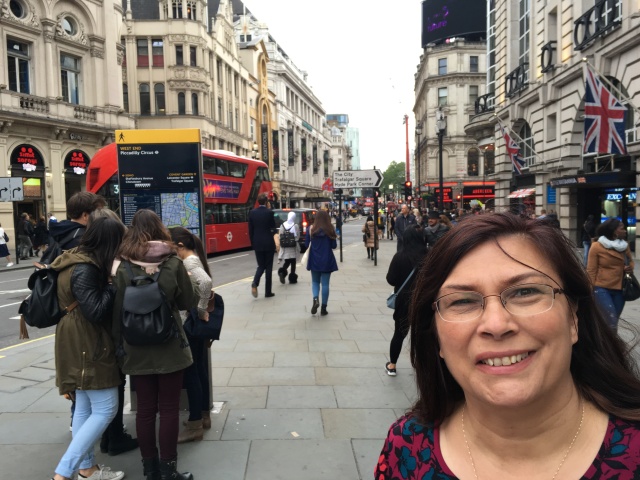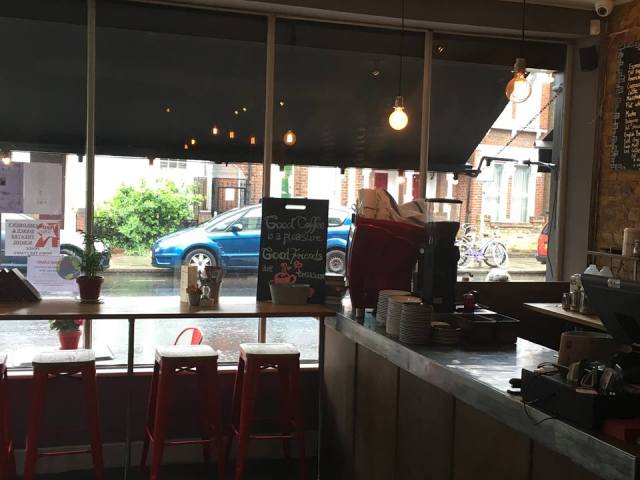As endless underground tube stops, countless footsteps to and from every possible sight, packed unimaginably into what amounts to an hourglass on my wife’s schedule I am, of course, café bound. Two very full days of touristing the hell out of London with a view to advancing my wife’s novel descriptors has left me washed out. She’s a veritable whirlwind in a thimble, a human hurricane of never-ending activity and world-wonder.

As a self-described artsy, bookish mystic, I’m sure you understand my reasons for writing. Besides, I’m sure she’s glad to be rid of me for a few hours. Who needs a needy poet on their back when there’s a world to conquer?
The morning started with a leisurely walk along the Thames through, first, an industrial district and later, through rows of prim, stately flats. Every time I see the Thames I am instantly reminded of how contextual our histories are. To hear Londoners speak of “the mighty Thames” after having lived beside the Columbia for a few years is quaint to the point of hyperbole.
It is however a river that has seen more history in a lunch hour than many others in their long, sweeping careers. At once lazy and overworked, her rippled, brown back shoulders international industry and commerce hard to rival.
It also makes for a lovely morning walk; a walk that has landed me in this very café.

My wife’s novel, now on perhaps its fourth title, provides much of the backdrop for this journey. She began writing this story almost four years ago. It has gone through many iterations, edits, rewrites, lapses – a great working metaphor for our lives generally.
As described in my first piece of this series I am here for reasons hard to name, hence the elusive title of “Trip to Bountiful.” If ever a story points well to the Celtic idea of hiraeth, it is this one. Contextualized in twentieth century Houston, it is in many ways a timeless tale of escape from an unpleasant present to the friendlier familiar where one hopes to find a reality more amenable to the longings of the heart. It is both escape and discovery. It is reality versus perception of reality.
The broken places of my present seek out the healing that can come from places connected to my psyche even deeper than my own short history. In the play, an aging Carrie Watts, living unhappily with family, dreams of escape from a claustrophobic Houston existence back to spacious Bountiful where she was raised.
The longer I explore this idea of ‘home’ and ‘longing’ and ‘be-longing’ the more I am skeptical of easy answers. The incarnational realities of daily existence in our physicality are demeaned by an over-spiritualized romanticism. We are a rooted people. We have a ‘where’ as much as a ‘why’ or ‘how.’ Conversely, the unnameable yearnings resident in every soul are never fully realized by placement in easy familiarities of youth and proclivity.
As ‘hiraeth’ suggests, we may at once long for what can never be again. But, as the even broader, more pervasive gospel narrative insists, in Christ we are everywhere, fully, ‘at home’ – even as exiles in a strange land – the often stifling realities of temporary displacement, geographically or otherwise.
Hence, even as I gaze out the window of this quaint café onto the rain-washed streets of London I do so sad that I must soon return to a familiar geography with an unfamiliar spiritual DNA, but do so completely happy.
Besides, it’s raining, and the coffee’s good here.

Enjoy! Loved my time in the UK and in London…
LikeLike
London is a brilliant place…for a time. There’s no shortage of sights and sounds for the thirsty traveller, but then the hillsides of Wales or Scotland are necessary to regather!
LikeLiked by 1 person
Definitely!
LikeLike
I couldn’t agree more, Michael! London was a blast, but it wears thin after awhile. The thin place of Celtic hill and dale is the place of hiraeth and happy dance!
LikeLike
I also get the need to retreat to a coffee shop for some serenity!
LikeLiked by 1 person
Reblogged this on innerwoven and commented:
I continue here my reblog commemoration of our UK “trip to bountiful” this time last year.
LikeLike